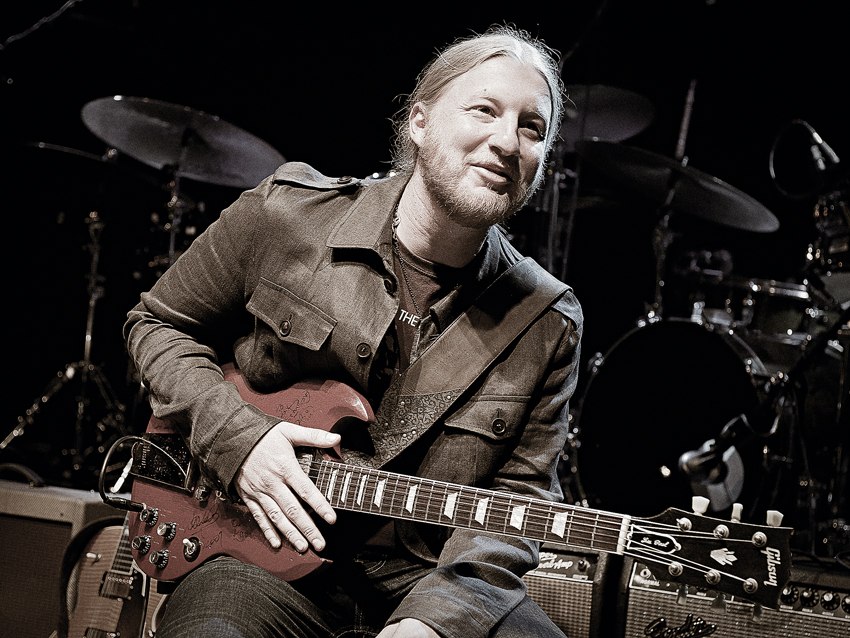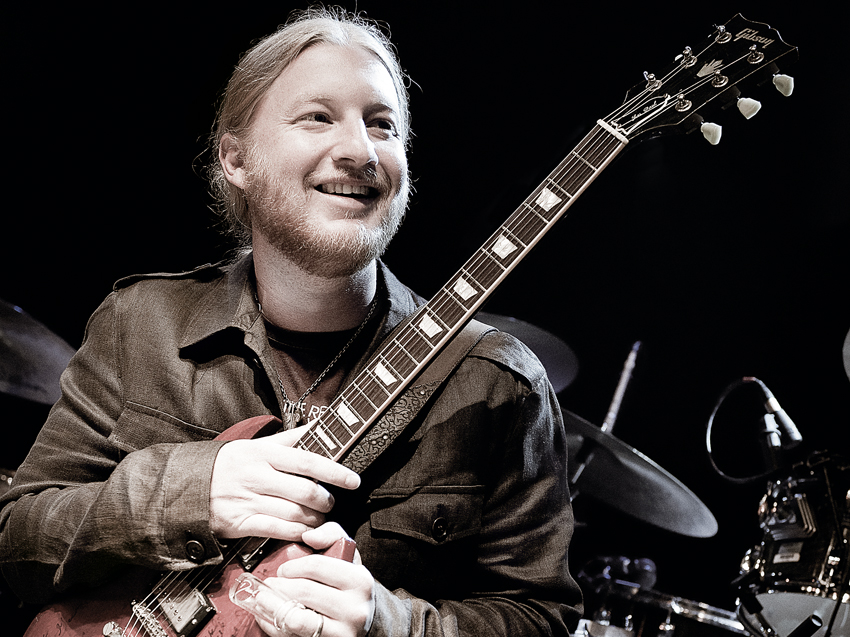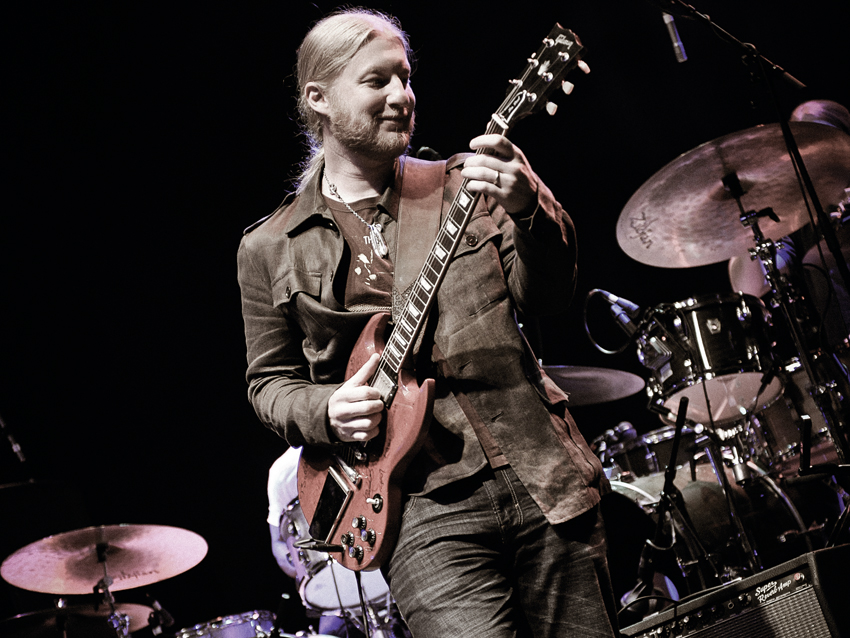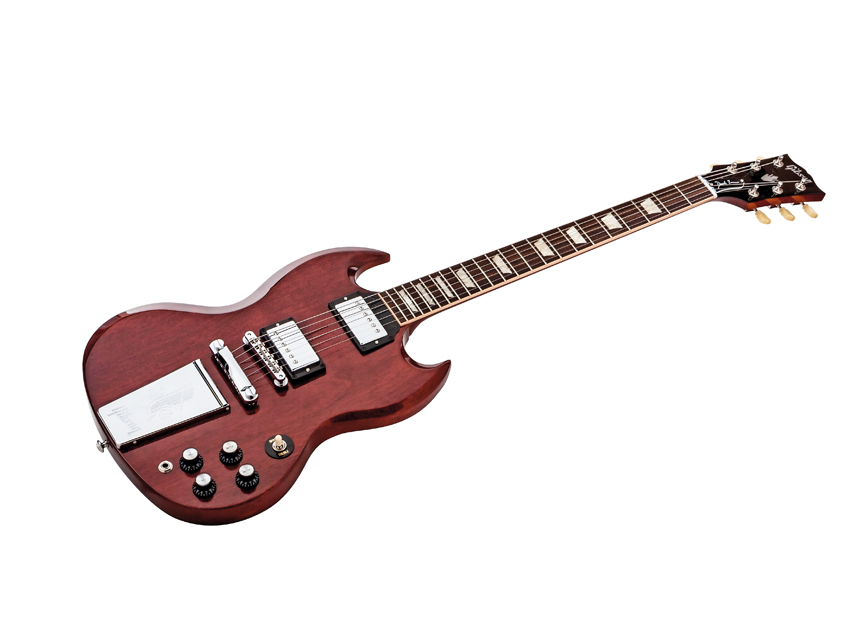Derek Trucks on the art of slide
Slide master talks tone and his new signature SG

Derek Trucks on the art of slide
From early days experimenting with a junk shop acoustic, Derek Trucks has become, arguably, slide’s greatest modern exponent, admired by everyone from Guthrie Govan to Clapton.
“Slide can sound like the most beautiful woman’s voice,” he reflects, “or like someone skinning a cat!” We ask Derek for his tips on how to coax heaven from six steel strings...
What first attracted you to slide?
“It was the sound of Duane Allman on the ...Fillmore East and Layla... records. I remember being eight or nine; it was the first music that really hit me hard. When I was around the same age, my father had some Elmore James records, and that was the next connection. It was that sound. There was something about the power of slide guitar, the way it emulated the human voice.”
What does slide let you do that regular guitar doesn’t?
“I think it’s one of the most lyrical instruments, if used correctly. Much in the way that a great gospel or soul singer hits me, it’s the microtones you can get. Y’know, the way you can lead up to a note, or fall away from a note. There’s no distinction between one note and the next: you’re hearing every inflection in between. On a good night, and in the right hands, it’s a pretty powerful thing. I think it’s a lot harder to bulls**t people as a slide player, as opposed to straight playing, because it’s so raw and honest.
"Y’know, you can sit in a room, practise all day, learn your scales and blaze blues riffs: it’s easy to hide behind that. But I think with the slide, it’s a little bit tougher. I’ve certainly heard people play that are bulls**tting.”
Slide sounds bad in the wrong hands, doesn’t it?
“Terrible. It’s a dangerous instrument. It can sound like the most beautiful woman’s voice in the world, or it can sound like someone skinning a cat.”
How about your first steps as a player?
“I was nine when I bought my first guitar at a garage sale. I remember my dad showed me some things, but it wasn’t until his friend brought over a slide – just one of those steel tubes – that it clicked. That was the sound I was looking for. I played it on acoustic first, and I’m certain the first riff I tried was Dust My Broom, which is the one everyone starts with, then Statesboro Blues.
"It came pretty quickly. When you’re that age, some things you’re just natural at, and I was fortunate that it came somewhat second nature. I was on the road a few months after really starting to play. I’m sure if I went back, I’d have a hard time listening to the early stuff now. You see the holes in it you didn’t realise when you were doing it.”

Strings and things
Do you remember the big breakthroughs?
“For me, it was about finding other people that played. I was lucky enough that my dad knew musicians in town who were willing to hang out and give me a lesson or two. The first time I met a guy who played in open E [E B E G# B E] it opened doors.
"I remember a lot of the sounds I heard on the Elmore records and the Duane stuff just didn’t sound right in standard tuning. When he tuned the guitar up to E, it seemed like it was all right there. I think those things were the big building blocks.”
What were the challenges of playing slide at the start?
“I think the hardest thing about slide is the thing that I probably didn’t even think about, which is intonation. Y’know, keeping it in tune. That’s really the whole thing with slide. To me, it’s a lot like singing. You can go after all these runs, but unless you’re hitting the notes and sliding into them the right way, and the inflections are right, then you lose the whole purpose.
“For me, I think the intonation was the part that came somewhat naturally. I think it was from listening to the way my dad would talk about music, saying how it’s so much more powerful when you see a musician play one note correctly, as opposed to just blazing all over the place. That was a big point. Substance over flash.
"But slide is a frustrating instrument when you first jump on it. If you get 10 people and show them how to play a scale, and they fret it properly, then it’ll sound pretty good. But if you get 10 beginners with a slide... it can sound pretty damn rough. That scares people off early on. The learning curve can be a little bit steep.”
What material do you prefer your slides to be made from?
“When I started, it was always a metal slide. Then somebody hit me to the fact that sometimes with electric, glass is a little sweeter, not as sharp and grating on the ear. Have I tried a knife or bottle? Oh yeah. All of that. Wine bottles. Steak bones.
"I remember reading Robert Palmer’s book, Deep Blues, about the Deep South backwoods Delta players, and how they would use anything. Butter knives. Lighters. Bones from meat. Whatever they had layin’ around. Over the years, you try all of it, just to get a different sound.”
Are strings much of a factor?
“Yeah. I don’t think you can go too light: it’s a lot harder to make a note sing out. But with all the gear stuff, you’ve gotta find your sound. I remember, not long ago, playing with Billy Gibbons and thinking how great his tone was – then realising he plays the lightest strings humanly possible. Before that, I was always of the mindset that the heavier the strings, the better the tone, period.
"So I’d hate to tell somebody not to keep searching, but for me, I’ve settled on DR strings, 0.011 through 0.046. So it’s 0.011, 0.014, 0.017, 0.026, 0.036, 0.046, a hybrid of different sets. That’s just come over the years. In the beginning, it was just buying packs of strings and realising, y’know, ‘I don’t like the way this third string feels’. Just over years of touring, you find what feels good. I do like a heavier string at the top. You can dig into it, be a little physical with it, without losing the tone.”

Tips and tricks
Do you ever listen back to your slide parts and think, ‘I was on fire at that session’?
“I don’t have that thought often! I don’t listen back much, but occasionally, we’ll relearn a tune and there’s something you don’t remember playing that you mildly enjoy. That happens. I mean, I try not to sit around and be a fan of my own stuff, but when we recorded Midnight In Harlem, as that solo section went down, it was so effortless and I just remember having that feeling that, y’know, this is what it feels like to record a tune you’re gonna be proud of for a long time.
"There are times when you get in a studio, or onstage, and it just happens. There’s other nights and other tracks where you just have to beat it into shape. But when this stuff is really flying, it becomes second nature.”
Do you feel like slide is flourishing – or is it a dying art?
“It’s around. I mean, there’s guys like Luther Dickinson, and there’s a lot of young guys. I remember watching this documentary on the knuckleball in Major League Baseball, and how there’s only ever one or two guys in the league that do it at any time. I feel like the slide is that way, too. It’s always been there in small numbers, but it’s a very specialised thing. There’s only going to be a certain percentage that take it up. And I like that.”
Do you have any advice for our readers on how to improve at slide?
“There are little things. Like, I remember being told how after you hit a note, you should fall off the note, y’know, instead of just laying right on it, or hitting the note and heading up. Instead of doing that, you kinda fall off of it, which is I think what happens naturally when you sing or talk.”
You’re a slide god, of course. Have you analysed how your style differs from that of other players?
“Y’know, I haven’t studied it enough to say, but I think it’s just the way you hear things and go about things. I think growing up around that sound gave me a serious head start. I don’t think there’s anything I’m doing that’s so difficult that other people aren’t doing it now – or won’t blow past it in the near future. I’ve always, up to this point, been the young guy looking up to people. But I’ve recently heard some young players where I’ve started thinking, ‘S**t, I gotta get it together, there’s people coming for ya!’”

Lyre, Lyre
This year sees the launch of the Derek Trucks signature model SG, complete with mods found on Derek’s stage guitars.So tell us more...
“The new signature model has all the little tweaks we’ve made to my own SGs over the years. It has different volume pots, so the swell is cleaner, and different capacitors. Y’know, my SG [a ’61 SG-shape Les Paul with a Lyre vibrato] had a vibrato on it, and we just took a hacksaw and yanked it off and put a stoptail in.
"The guitar they finally ended up building for me is great. On the rack, it’s a normal setup: it’s not set up for slide. But even the way I play my own SG, in open tuning, the action is not unreasonably high, so it’s not far off that anyway.”
What made you choose an SG for slide?
“The SG has always served me well. I mean, my first few guitars were just garage-sale and pawn-shop beaters, but my first real guitar that I was excited about was an off-the-rack SG in the early 90s. I played that forever. I tried other guitars, but I would always come back to the SGs.
"It just felt like there was something about the weight, and the sound for slide, and the access that you have way up on the neck. It just felt right. It’s always been my go-to. So I guess in the last five years, I’ve been fighting the urge to try other things.”
Do you have a particular setup?
“Y’know, I mainly play in open E, and I think because of that, I don’t have to keep the action as high. My SG has got a relatively low action, but the tension of having it tuned up, I think, makes that possible. It’s nothing too unique. I always feel like the bulk of it is really in your hands. It’s less about the gear, and more about the approach and the attack.”
For more information visit the official Derek Trucks website, or connect with him on Twitter and Facebook.

